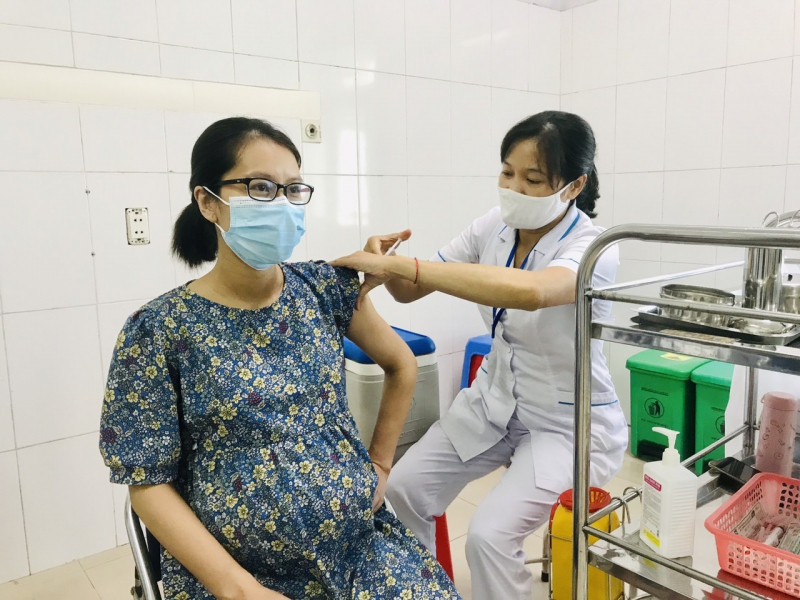Risks for unvaccinated pregnant women when infected with Covid-19
(Baonghean.vn) - According to some studies, COVID can destroy the placenta, cause stillbirth and cause other potential risks to pregnant women and fetuses.
1. SARS-CoV-2 virus can destroy the placenta and cause serious complications
Stillbirth is one of the potential problems that the Centers for Disease Control and Prevention (CDC) has warned could occur in pregnant women with COVID-19, and why they encourage pregnant women to get vaccinated against COVID-19.
A team of 44 researchers from 12 countries, led by Dr. David Schwartz, a perinatal pathologist in Atlanta, looked at placental tissue from 64 stillbirths and four newborns who died shortly after birth. All of the fetuses were born to unvaccinated women who had COVID-19 during pregnancy.
According to research, the SARS-CoV-2 virus can directly attack and destroy the placenta, leading to suffocation and stillbirth. This is an uncommon outcome for any pregnancy, but women with COVID-19 face a high risk. Researchers found that: On average, more than three-quarters of the placentas were severely damaged, the organ unable to provide oxygen and nutrients to the growing baby. In some cases, more than 90% of the placentas died. However, according to experts, vaccination can help prevent these cases.
 |
| Pregnant women need to be vaccinated against Covid-19. Photo: BV |
A report from the Centers for Disease Control and Prevention found that among pregnant women in the United States who were infected with COVID-19, about 1 in 80 births were stillbirths — the loss of a fetus at any time after 20 weeks. That compared with 1 in 155 of women who were not infected. Stillbirths in the study occurred on average at 30 weeks; normal pregnancies last about 40 weeks.
Another study published in the Journal of the American Medical Association (JAMA) found that pregnant women infected with COVID-19 appear to be more likely to experience serious complications or death during pregnancy than those who are not infected with the Coronavirus.
2. Mild COVID can also have an impact
Pregnant women with COVID are at increased risk of infection because pregnancy weakens the immune system. What makes COVID different from other viral infections during pregnancy is how it infects the body and, in particular, how that infection persists and restricts blood flow to the placenta. But COVID can cause serious problems even in women who do not get very sick.
Dr. Tuan Anh - Central Obstetrics Hospital said: Women with very mild symptoms from COVID also cause placental damage, if the damage is a small part of the placenta, it may not cause any complications. But if it is a larger damage, it can limit the development of the fetus and reduce fetal movement, and can even cause miscarriage.
3. Screening should be done during pregnancy.
Early research suggests that SARS-CoV-2-associated placental inflammation occurs over a period of 2 days to 2 weeks, according to Dr. Schwartz. Obstetricians are recommended to perform second-trimester ultrasounds on women who have had COVID infection during pregnancy to screen for warning signs that could endanger the baby. "Obstetricians may see placental insufficiency occurring during the exam," Dr. Schwartz said.
Pregnant women infected with COVID-19 (including those who have recovered) need to be monitored every 2-4 weeks to detect early cases of preeclampsia, intrauterine growth retardation, and threatened/preterm labor.
4. Misconceptions about COVID-19 vaccination
Not only many pregnant women in Vietnam but also in many countries around the world do not understand the importance of getting vaccinated against COVID-19 during pregnancy. According to Dr. Truong Huu Khanh - Children's Hospital 1, Ho Chi Minh City, pregnant women need to avoid 3 misconceptions:
First, after getting vaccinated and finding out you're pregnant, you panic, but it's actually okay.
Second, waiting until the fetus is a little older before getting the injection is also wrong.
Third, not getting vaccinated near birth, but waiting until after birth, is also wrong.
Dr. Khanh noted that if you get sick during this time of hesitation, it will be extremely dangerous for both mother and baby.
While reality and many studies have shown that COVID-19 vaccination is important to improve the chances of having a healthy baby without complications if you get COVID-19 during pregnancy.
Unvaccinated pregnant women with moderate to severe COVID-19 symptoms were more likely to need a cesarean section, have a preterm birth, bleed after delivery or die around the time of delivery than those who did not have the infection or had no or mild symptoms, according to a study of more than 13,000 pregnant women from 17 U.S. hospitals published in the journal JAMA.
They are also more likely to get seriously ill from infections other than COVID, have increased risks of high blood pressure, pregnancy loss, and infant death.
The study is one of the first to find that COVID infection increases the risk of serious pregnancy complications, said Torri Metz, PhD, a professor of obstetrics and gynecology at the University of Utah who led the study. The study was conducted before the vaccine was rolled out in the U.S., but the findings underscore why pregnant women should be vaccinated. Dr. Metz also pointed to other studies that have shown vaccination prevents the most severe symptoms of the disease.
A separate study published in JAMA found that vaccination during pregnancy produced a stronger immune response than infection in unvaccinated mothers, leading to longer-lasting antibodies in newborns and higher antibody levels in mothers. “We hope these findings will provide additional motivation for pregnant women to get vaccinated, especially with the emergence of new variants of concern like omicron,” said Dr. Andrea Edlow, a maternal-fetal medicine specialist at Massachusetts General Hospital and co-author of the study.
In another recent study of 144,000 pregnancy records from December 2020 to October 2021, researchers found that 98% of COVID-19 hospitalizations required intensive care and all infant deaths in pregnant women were unvaccinated.
